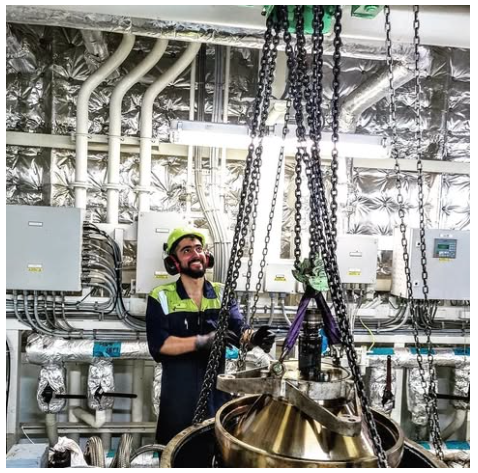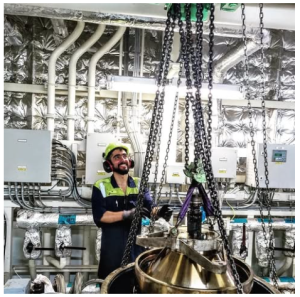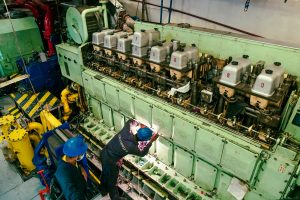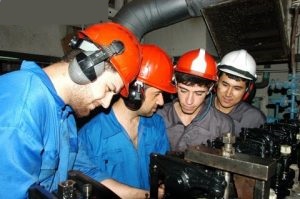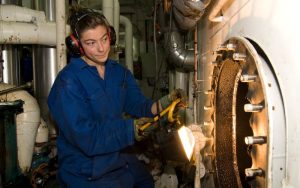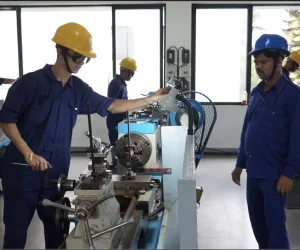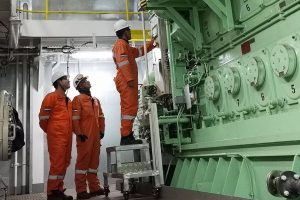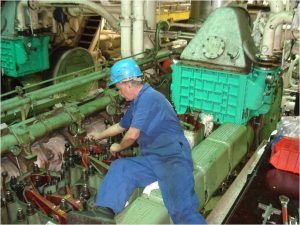The ship engine room is the operational heart of a ship, where all machinery essential for propulsion, electricity generation, and onboard services functions continuously. Ensuring engine room safety and maintaining equipment reliability are critical for uninterrupted maritime operations. This article explores essential safety protocols, maintenance strategies, and preventive measures to keep engine rooms secure, efficient, and compliant with international maritime regulations.
Importance of Engine Room Safety – Engine room safety is crucial for several reasons:
- Operational Continuity: Equipment failures can cause costly delays, vessel downtime, and even accidents.
- Crew Welfare: A safe environment prevents injuries and reduces onboard hazards.
- Environmental Compliance: Proper maintenance minimizes the risk of oil spills, gas leaks, and pollution.
- Regulatory Compliance: Adherence to safety standards like the International Maritime Organization’s (IMO) Safety of Life at Sea (SOLAS) Convention ensures legal compliance.
Key Safety Protocols in the Engine Room
1. Fire Prevention and Firefighting Readiness
- Fuel and Lubricant Management: Store flammable liquids in approved containers and monitor fuel systems for leaks.
- Fire Detection Systems: Install automatic fire detection systems and regularly test them.
- Fire Suppression Systems: Maintain fixed fire suppression systems such as CO2, foam, or water mist systems.
- Crew Training: Conduct regular fire drills and ensure crew members are familiar with firefighting procedures.
2. Electrical Safety
- Insulation and Grounding: Regularly inspect electrical wiring, circuits, and panels.
- Overload Protection: Install automatic circuit breakers to prevent overload and short circuits.
- Emergency Lighting: Ensure emergency lighting systems are functional during power outages.
3. Machinery Space Ventilation
- Air Circulation: Proper ventilation prevents the buildup of toxic gases and overheating.
- Ventilation Maintenance: Inspect and clean ventilation ducts regularly to avoid blockages.
4. Personal Protective Equipment (PPE)
- Mandatory Gear: Equip crew members with PPE such as safety helmets, gloves, protective eyewear, and hearing protection.
- Compliance Checks: Conduct routine PPE inspections to ensure compliance.
Maintenance Schedules and Practices
Preventive maintenance ensures optimal engine room performance while reducing breakdowns. Key maintenance schedules include:
1. Daily Checks
- Oil and Fuel Levels: Monitor levels and refill as needed.
- Leak Detection: Inspect for oil, fuel, and coolant leaks.
- Control Panel Monitoring: Check operational parameters such as temperature, pressure, and voltage.
2. Weekly Inspections
- Belt and Pulley Checks: Inspect and adjust belts and pulleys to prevent slippage.
- Filter Cleaning: Clean air, fuel, and oil filters to avoid clogging.
- Battery Maintenance: Test and charge batteries to ensure backup power.
3. Monthly Maintenance
- Lubrication of Machinery: Apply recommended lubricants to reduce friction and wear.
- Pump and Valve Checks: Inspect and test pumps, valves, and piping for proper operation.
4. Quarterly Servicing
- Generator Servicing: Conduct generator load testing and replace worn components.
- Engine Overhauls: Inspect cylinder heads, pistons, and fuel injectors.
5. Annual Overhauls
- Major Equipment Servicing: Perform comprehensive inspections of engines, compressors, and heat exchangers.
- Class Inspections: Ensure compliance with classification society inspections such as those conducted by Lloyd’s Register or ABS.
Preventive Measures for Engine Room Safety
Implementing preventive measures can reduce the risk of accidents and ensure operational reliability:
1. Planned Maintenance System (PMS): A computerized PMS schedules and records maintenance tasks, tracks spare parts, and ensures timely service checks.
2. Condition Monitoring: Use condition-based monitoring tools like vibration analysis, thermography, and ultrasonic testing to detect early signs of wear.
3. Emergency Preparedness: Contingency Plans: Develop detailed emergency procedures. Emergency Drills: Conduct fire, flood, and evacuation drills.
4. Crew Training and Competency: Technical Training: Provide ongoing technical training on engine operation, maintenance, and troubleshooting. Safety Workshops: Conduct regular safety workshops emphasizing hazard awareness and accident prevention.
Common Engine Room Hazards and Case Studies
Several notable engine room incidents provide valuable lessons:
Case Study 1: Engine Room Fire on an Oil Tanker: An oil tanker suffered a severe engine room fire due to a leaking fuel line igniting on hot surfaces. Investigations revealed that worn-out fuel hoses and delayed maintenance were key causes. As a result, the shipping company enhanced its maintenance protocols and mandated quarterly fuel system inspections.
Case Study 2: Generator Failure on a Container Ship: A container ship experienced a complete generator failure mid-voyage due to neglected electrical maintenance. This resulted in power loss, cargo delays, and emergency repairs. The incident underscored the need for rigorous electrical inspections and generator testing.
Regulatory Compliance and International Standards
Ensuring engine room safety requires compliance with international maritime regulations such as:
- SOLAS Convention: Covers fire safety, electrical systems, and crew training.
- MARPOL (Marine Pollution) Convention: Addresses pollution prevention through effective waste management and machinery maintenance.
- ISM Code (International Safety Management): Requires shipping companies to implement Safety Management Systems (SMS).
- ILO Maritime Labour Convention (MLC): Ensures safe working conditions, rest hours, and crew welfare.
Future Trends in Engine Room Maintenance
Technological advancements are reshaping engine room management. Key trends include:
- Automation and Remote Monitoring: Automated monitoring systems enable real-time data analysis and remote diagnostics.
- Predictive Maintenance: AI-powered systems predict equipment failures before they occur.
- Green Technologies: Eco-friendly engine designs reduce emissions and comply with environmental regulations.
Engine room safety and maintenance are vital for ensuring the reliability and efficiency of maritime operations. By following established safety protocols, implementing preventive maintenance practices, and complying with international maritime regulations, ship operators can minimize risks, reduce downtime, and ensure safe and efficient voyages. With ongoing advancements in technology and safety standards, the future of engine room management looks promising for the global shipping industry.

